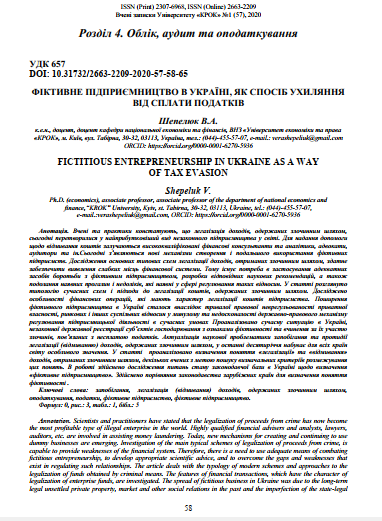FICTITIOUS ENTREPRENEURSHIP IN UKRAINE AS A WAY OF TAX EVASION
DOI:
https://doi.org/10.31732/2663-2209-2020-57-58-65Keywords:
prevention, legalization (laundering) of proceeds from crime, taxation, taxes, fictitious enterprise, fictitious businessAbstract
Scientists and practitioners have stated that the legalization of proceeds from crime has now become the most profitable type of illegal enterprise in the world. Highly qualified financial advisers and analysts, lawyers, auditors, etc. are involved in assisting money laundering. Today, new mechanisms for creating and continuing to use dummy businesses are emerging. Investigation of the main typical schemes of legalization of proceeds from crime, is capable to provide weaknesses of the financial system. Therefore, there is a need to use adequate means of combating fictitious entrepreneurship, to develop appropriate scientific advice, and to overcome the gaps and weaknesses that exist in regulating such relationships. The article deals with the typology of modern schemes and approaches to the legalization of funds obtained by criminal means. The features of financial transactions, which have the character of legalization of enterprise funds, are investigated. The spread of fictitious business in Ukraine was due to the long-term legal unsettled private property, market and other social relations in the past and the imperfection of the state-legal mechanism of regulation of business in modern conditions Analyzed the current situation in Ukraine, illegal state registration of business entities with signs of fictitious and Commission with their participation of crimes related to tax evasion. Actualization of scientific problems of prevention and counteraction to legalization (laundering) of proceeds from crime, in recent decades, is of particular importance for all countries of the world. The article analyzes the definition of "legalization" and "laundering" of proceeds from crime, several scientists in order to find the defining criteria of differentiation of these concepts. The study of the state of the legislative framework in Ukraine by the definition of "fictitious entrepreneurship". A comparison of the legislation of foreign countries to determine the concept of fictitiousness.
Downloads
References
Мандибура В. О. Тіньова економіка України та напрямки законодавчої стратегії її обмеження. Київ : Парламентське, 2006. 135 с.
Моделювання оцінки ризиків використання банків з метою легалізації кримінальних доходів або фінансування тероризму : монографія / Дмитров С. О., Меренкова О. В., Левченко Л. Г., Медвідь Т.А. Суми : ДВНЗ «УАБС НБУ», 2008. 75 с.
Про запобігання та протидію легалізації (відмиванню) доходів, одержаних злочинним шляхом, фінансуванню тероризму та фінансуванню розповсюдження зброї масового знищення : Закон України від 19.09.2019 № 113-IX, втратив чинність 28.04.2020, підстава - 361-IX. URL : https://zakon.rada.gov.ua/laws/show/1702-18.
Кримінальний кодекс України редакція від 28.04.2020, підстава - 361-IX. URL : https://zakon.rada.gov.ua/laws/show/2341-14.
Брадул О. М. Судово - бухгалтерська експертиза : підручник. Київ : Кондор. 2015. 450 с.


